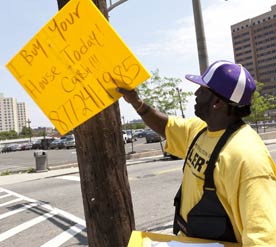
One-for-one replacement: PETRA needs to clearly state that there will no net loss of hard housing units. While HUD descriptions of PETRA purport to assure one-for-one replacement of any public housing converted to project-based assistance, there is a sizable loophole. As currently written, the proposal would permit half of the hard units to be demolished and not replaced under some circumstances. Vouchers would be issued instead. Everyone knows that a tenant-based voucher does not a replacement unit make.
In perpetuity: One of the most frequent criticisms of PETRA is the risk that public housing could be privatized. It is easy to understand why people think that when the bill calls for only a 30-year use restriction on public housing units that are converted to the new rental subsidy. The housing must be affordable for the people for whom it is intended in perpetuity. The investment made now must assure that the housing is available for future generations.
Funding mobility: PETRA would significantly expand mobility options for residents of public housing, but at the expense of the people already on local voucher waiting lists. Under the mobility provisions, residents of converted units who want to move after two years would go to the top of the voucher waiting list. This is unfair. PETRA needs to authorize enough new vouchers to carry out its mobility proposals fairly.
Resident participation: HUD’s proposal for resident participation relies on the PHA planning process, which has been effectively gutted over the past several years. PETRA needs to restore and enhance that process.
PETRA also would codify the right to organize currently enjoyed by residents of HUD-assisted housing in regulation and expand it to public housing residents, a long overdue step. Unfortunately, their ability to exercise these rights would be diminished because funding for resident participation would no longer be assured for each public housing agency.
Currently, each PHA must direct $25 per unit per year to its tenant organizations. PETRA would change the funding stream for tenant organizations to a competitive grant program. While the current system is flawed and funds for genuine resident participation/tenant organizing should not be controlled by the PHAs, a competitive grant by definition will produce winners and losers. Most existing PHA resident organizations would be defunded with no access to alternative resources. HUD must assure funding is available to all viable public housing resident organizations.
Finally, the core premise of the preservation objectives of PETRA is that the capital needs of public housing are so extensive that there will never be enough money in the HUD budget to address this backlog. And yet, no HUD Secretary in recent memory has actually asked for enough money to restore public housing to high-quality properties. It could not hurt to ask.




Comments